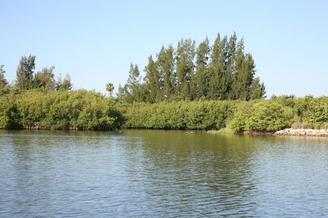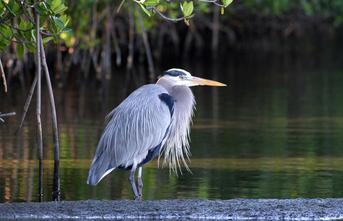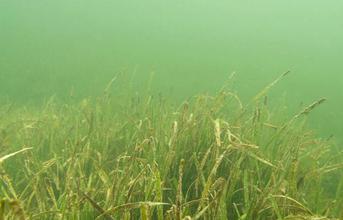Indian River Lagoon Symposium
The Indian River Lagoon (IRL) Symposium is the result of a multi-institutional, multi-agency effort to provide a forum for discussing Indian River Lagoon science and its application to the management of the lagoon. The symposium is open to scientists, decision-makers, students, education and outreach professionals, and the interested public. The intent is to facilitate better communication among these groups so that the gaps between research and its application can be narrowed.
The goals of the symposium are to:
The theme for the 2025 symposium was The IRL in a Changing Climate. The Indian River Lagoon is facing significant challenges due to global change, through alterations to natural and anthropogenic drivers. These changes threaten the delicate balance of its ecosystem, impacting local wildlife and water quality. As conditions continue to evolve, the lagoon's health and resilience are increasingly at risk.
.
Venue: Harbor Branch (for directions, see (https://www.fau.edu/hboi/about/location-maps/) is located along the Indian River Lagoon in Fort Pierce, Florida, centrally located between the cities of Fort Pierce and Vero Beach.
Program Schedule: Technical sessions, consisting of oral and poster presentations was held all day on Thursday, February 20, 2025, on all aspects of science related to the IRL. A poster session was held from 5:00 to 8:00 p.m.
A half-day IRLS Forum: Collaboration and Communication was held on Friday, February 21, 2025, from 8:30 a.m. to 12:30 p.m. The IRLS Forum on Day 2 focused on fostering better collaboration and communication between diverse IRL stakeholder groups while sharing lessons learned and building relationships. Oral presentations will be given by resource managers, researchers, restoration practitioners, and environmental organizations working in the lagoon, highlighting efforts to promote ecosystem health and awareness. Presentations will be limited to 5 minutes and 3-5 slides, ensuring that insights are shared concisely and efficiently, while encouraging audience engagement in a collaborative setting. Whether aiming to spark new partnerships, share lessons learned, or introduce a fresh initiative, this will be the perfect platform to foster meaningful collaboration and strengthen connections among IRL stakeholders.
Registration Information:
We reached full capacity for the IRLS Technical Sessions on January 21, 2025, and registration was closed.
Please be advised that registration is non-refundable beginning Monday, February 17, 2025.
IRLS Technical Sessions (February 20, 2025): – REGISTRATION CLOSED: Registration for the technical session, required for all participants, included access to all sessions, coffee breaks, lunch, and end-of-the-day reception. Please register at: Indian River Lagoon Symposium 2025 Registration – Technical Sessions. Early registration fees are $50 (regular) and $25 (students) and are due for all participants by January 17, 2025. Late registration fees are $65 ($40 for students). Late registration closes February 5, 2025, at 5 p.m., unless availability ends sooner, which is quite likely based on previous years (e.g., IRLS 2024 hit the enrollment cap on January 19, 2024).
Students: Note that when you first connect to the site, the default registration is the full participant amount, but once you designate yourself as a student, you will then see the lower rate.
Poster Session Only: For those who wish to attend the poster session, which was held from 5:00 to 8:00 p.m. on Thursday, February 20, 2025, there are no registration fees. However, since HBOI is a secure, closed campus, anyone wishing to come to the poster session needs to be added to our campus access list. To get on that list, complete the Poster Session Campus Access Google Form. No one will be admitted to campus without registration per above or by addition to the campus access list through the Google Form.
IRLS Forum (February 21, 2025): Registration for the IRLS Forum, required for all participants, includes access to all sessions, and coffee breaks. Registration for the IRLS Forum is complimentary. Please register at: Indian River Lagoon Symposium 2025 Registration – IRLS Forum. Registration for the IRLS Forum closed February 14, 2025, at 5 p.m.
Live Stream: A live stream of the symposium is available for those who wish to view remotely. Registration for the live stream is complimentary. Please register at: Indian River Lagoon Symposium 2025 Registration - Live-Stream. After you register, a link will be provided for you to watch from another location other than the live event at Harbor Branch. You will not have access to the campus during this event. The recordings for both days of IRLS 2025 will be available after they end. The link will be posted to http://www.indianriverlagoon.org/Symposium.html.
Steering Committee: A Steering Committee with representatives from academic, governmental, and non-profit organizations defines the goals, basic outline, and structure for the symposium; identifies potential participants; and provides guidance, logistical support, and planning for the symposium. The Steering Committee is instrumental in making the symposium a truly collaborative effort within the diverse IRL research community. The 2025 Steering Committee members are:
- Irene Arpayoglou – FDEP/Indian River Lagoon Aquatic Preserves
- Rachel Brewton – Florida Atlantic University
- Kristen Davis – Florida Atlantic University
- Kelli Hunsucker – Florida Institute of Technology
- Chuck Jacoby – University of South Florida
- Tim Moore – Florida Atlantic University
- Elizabeth Salewski – South Florida Water Management District
- Loraé Simpson – St. Johns River Water Management District
- Holly Sweat – Smithsonian Marine Station at Fort Pierce
- Linda Walters – University of Central Florida
- Jessy Wayles – Indian River Lagoon National Estuary Program
Please contact indianriverlagoonsymposium@gmail.com with any questions.
IRLS 2025 The IRL in a Changing Climate
The program for the Technical Session is available here.
The Abstracts of Presentations for the Technical Session are available here.
The program for the IRLS Forum: Collaboration and Communication is available here.
The Abstracts of Presentations for the IRLS Forum: Collaboration and Communication is available here.
IRLS 2024 IRL Fish
The program is available here.
The Abstracts of Presentations are available here.
IRLS 2023 IRL Seagrass
The program is available here.
The Abstracts of presentations are available here.
The forum program for Indian River Lagoon 2023 Update is available here.
IRLS 2022 IRL Connectivity Materials
The Abstracts of Presentations are available here.
The forum program for Indian River Lagoon 2022 Update is available here.
IRLS 2021 IRL Research during the Pandemic Materials
The final program is available here.
The Abstracts of Presentations are available here.
Indian River Lagoon Symposium 2021 Posters can be viewed here.
IRLS 2020 Reassessing IRL Biodiversity Materials
The program is available here.
The Abstracts of Presentations are available here.
Information on programming for the public is available here.
IRLS 2019 Indian River Lagoon: Quo Vadis? Materials
The program is available here.
The Abstracts of Presentations are available here.
The program for this year's public outreach is available here.
IRLS 2018 Restoration of the Indian River Lagoon Materials
The program is available here.
The Abstracts of Presentations are available here.
The program for this year's public outreach is available here.
IRLS 2017 An Estuary in Peril Materials
The program is available here.
The Abstracts of Presentations are available here.
The program for this year's public outreach is available here.
IRLS 2016 Linking Research with Management Materials
The program is available here.
The Abstracts of Presentations are available here.
The program for this year's public outreach is available here.
IRLS 2015 Lessons, Challenges, and Opportunities Materials
A program is available here.
The Abstracts of Presentations are available here.
The program for the public forum Engaging the Public: Citizen Science is available here.
IRLS 2014 Lagoon Biodiversity Materials
A program is available here.
Abstracts of Presentations are available here.
The program for the public forum A Forum with the Indian River Lagoon Counties Collaborative is available here.
IRLS 2013 Health of the Lagoon Materials
A program is available here.
Abstracts of Presentations are available here.
The program for the public forum A Forum on Lagoon Health is available here.
IRLS 2012 Looking Forward Materials
A program is available here.
Abstracts of Presentations are available here.
Indian River Lagoon Symposium 2025
February 20-21
"The IRL in a Changing Climate"
• Provide a forum to disseminate current knowledge of the IRL and its management
• Foster collaborations and discussions among scientists, students, education and outreach professionals, and decision makers
• Promote participation of university students and new scientists
• Provide results and discussions that can be used to inform policy related to management of the IRL
• Increase public awareness of the IRL and its ecological and economic importance


